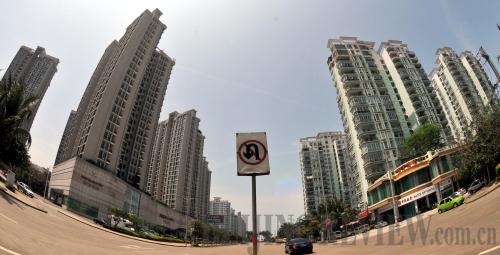|
 |
|
CONTINUED EFFORTS: A housing project in Haikou, capital of south China's Hainan province (HOU JIANSEN) |
The recent housing price cut sent a chill through Shanghai's housing market like the first cold spell of the looming winter. Longfor Properties Co. Ltd. cut the prices of its projects to 14,000 yuan ($2,205) per square meter a few days ago from 18,000 yuan ($2,835) on the outskirts of Shanghai. Two other developers—China Overseas Land and Investment Ltd. and Greenland Group—also dropped their prices by nearly 30 percent.
Housing markets in big cities have all been mired in a downturn as a result of cooling measures. In addition to price drops, sales volume also showed signs of easing off.
During the traditional housing sales golden week—the National Day holiday (October 1-7), 16 of the nation's 20 major cities saw year-on-year reductions in home sales, said China Index Academy (CIA), a domestic real estate research institute based in Beijing. In eight cities, the sales volume tumbled more than 50 percent. For example, Ningbo of Zhejiang Province saw a 78-percent drop and Shenzhen of Guangdong Province, 90 percent.
Lower real estate prices signal that government efforts to cool the market are working, said Qin Hong, Deputy Director of the Policy Research Center under the Ministry of Housing and Urban-Rural Development, at a recent forum.
Since September 2010, the Chinese Government has raised the down payments for buying a second home, shut the door completely for mortgages on third homes and increased interest rates for second-time homebuyers.
After that some first- and second-tier cities put a limit on the number of homes each family can buy. At the beginning of this year, Chongqing and Shanghai municipalities also kicked off the long-awaited property taxation trial.
"The government must take effective measures to consolidate the fruits of housing price control," said Premier Wen Jiabao during a visit to southwest China's Guangxi Zhuang Autonomous Region on October 21-22.
Meanwhile, a questionnaire conducted by the central bank in the third quarter shows that 75.6 percent of the respondents consider housing prices too high and unbearable, representing a record high since 2009, and 23.6 percent of the respondents still prefer real estate over other investment options.
Premier Wen stressed that China must continue efforts to control food and housing prices to ease soaring inflation and maintain economic development and social stability.
The tightening policies on the housing market have successfully tamed the speculative demand for real estate, said Li Jing, JP Morgan Global Market Managing Director and Chairman of China.
Tightening policies have squeezed the space for speculative investment in the housing market. After the down payment for the first-home purchase increased to 30 percent and second-home purchase to 50 percent in September 2010, the down payment for second-home purchase increased to 60 percent in January 2011.
In addition to a higher down payment ratio, lending has become more and more difficult. Second-home buyers need to pay an extra 10 percent more than the benchmark interest rate and banks are not allowed to lend to third-home buyers.
Purchase limit policies stipulate that no loans should be provided to homebuyers without a local social security record dating back at least one year.
Higher down payment ratios and higher interest rates mean homebuyers pay a higher cost and make lower profits from speculative housing investments, said Hu.
After the National Day holiday (October 1-7), China Construction Bank (CCB), the country's biggest housing lender, increased the interest rate by 10 percent higher than the benchmark rate, even for first-home buyers.
"CCB's new move was a result of financial strain. Other banks may follow suit," said Guo Tianyong, Director of the Research Center of China's Banking Industry at the Central University of Finance and Economics.
| 